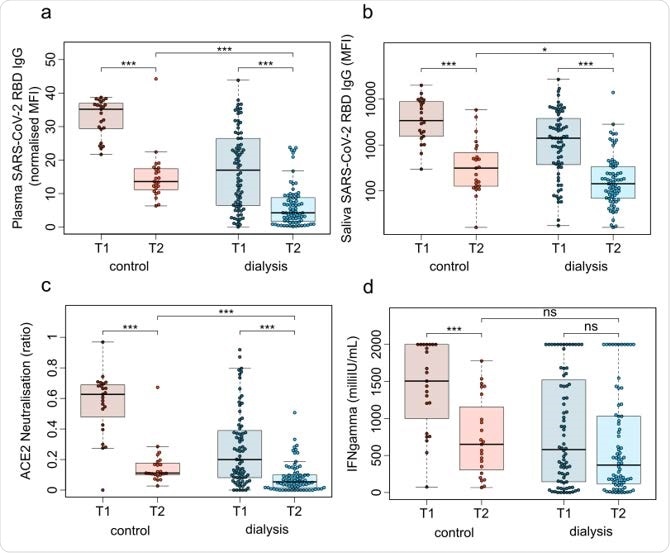Approximately 80,000 patients require renal replacement therapy in Germany. Hemodialysis therapy requires in-person treatment, increasing the risk for coronavirus exposure or self-isolation. The data supports the need for a third booster shot in hemodialysis patients and other individuals at high risk of coronavirus exposure.

 This news article was a review of a preliminary scientific report that had not undergone peer-review at the time of publication. Since its initial publication, the scientific report has now been peer reviewed and accepted for publication in a Scientific Journal. Links to the preliminary and peer-reviewed reports are available in the Sources section at the bottom of this article. View Sources
This news article was a review of a preliminary scientific report that had not undergone peer-review at the time of publication. Since its initial publication, the scientific report has now been peer reviewed and accepted for publication in a Scientific Journal. Links to the preliminary and peer-reviewed reports are available in the Sources section at the bottom of this article. View Sources
How they did it
The research team measured the immune response of 76 patients receiving hemodialysis several weeks after vaccination. In addition, about 23 healthcare workers with no underlying health conditions were also assessed as a control group.
Measurement of B-cells, T-cells, and vaccine-induced neutralizing antibodies was taken four months after individuals received their second Pfizer-BioNTech shot. They evaluated each individual’s antibody responses toward several variants of concern — Alpha, Beta, Gamma, and Delta.
Vaccinated hemodialysis patients showed decreased IgA and IgG levels
Three weeks after the second dose, antibody titers were significantly decreased by 61% in the control group and 75% in the dialysis group.
Sixteen weeks after vaccination, dialysis patients showed a more pronounced decrease in IgG response towards the original SARS-CoV-2 receptor binding domain than the control group.
Saliva anti-RBD IgG levels at the mucosal site also showed a significant decrease in dialysis patients compared to healthcare workers with no underlying conditions.
Anti-RBD IgA levels were significantly different between the hemodialysis group and the control group. About 75% of dialysis individuals and 47.8% of the control group were seronegative.
The researchers explained that the decrease in IgA and IgG levels might be due to IgA’s shorter half-life.

Humoral and cellular responses induced by BNT162b2 against SARS-CoV-2 significantly decrease from 3 weeks to 16 weeks post-second vaccination.
About 17.1% of hemodialysis patients show no vaccine-elicited T- and B-cell response
Vaccinated hemodialysis patients showed significantly lower neutralizing antibody activity against the original SARS-CoV-2 strain four months after complete vaccination. About 89.5% of dialysis samples and 82.6% of control samples fell below the 0.2 threshold, signifying a lack of neutralizing activity.
“This is a substantial significant reduction in neutralizing activity compared to 3 weeks post-second vaccination, where only 4.3% of the control samples and 50.0% of the dialysis samples were below the threshold,” explained the researchers.
An observed lack of serological response in hemodialysis patients may be from the absence of a B-cell response. Results showed that hemodialysis patients had a 2.6% T-cell response but no B-cell response. To compare, the control group showed a 23.6% B-cell response but no T-cell response.
There were 17.1% of patients in the dialysis group who showed no B- or T-cell response towards SARS-CoV-2.
“For dialysis patients, this is particularly concerning as they often suffer from comorbidities, which put them at additional risk for severe COVID-19. The lack of a considerable SARS-CoV-2 specific T-cell response in dialysis patients may result from chronic inflammatory conditions leading to T-cell exhaustion and suppression of IFN levels,” explained the researchers.
Vaccinated hemodialysis patients have reduced humoral response against VOCs
Vaccinated hemodialysis patients showed a decreased neutralization response for all variants of concern compared to the original SARS-CoV-2 strain.
Compared to the first-time antibody levels that were measured, hemodialysis patients showed a significant decline in neutralization for both the Alpha and Beta variants.
Antibody levels were not initially measured against Delta and Gamma in the initial analysis. Because of this, the researchers were unable to observe the changes in protection against these variants over time.
The dialysis group showed more reduced neutralizing activity than the control group against Alpha, Gamma, and Delta. However, differences in neutralizing activity against the two cohorts were not significant for the Beta variant.
About 93.4% of dialysis patients were non-responders against Alpha, 100% were non-responders against Beta and Gamma, and 96.1% were non-responders against the Delta variant.
Study limitations
The study is based on a small sample of hemodialysis patients and was not age or gender-matched. However, the researchers argue the results are consistent with prior studies looking into dialysis vaccine responses.
Their results suggest future vaccination strategies will require additional booster shots in this patient population.

 This news article was a review of a preliminary scientific report that had not undergone peer-review at the time of publication. Since its initial publication, the scientific report has now been peer reviewed and accepted for publication in a Scientific Journal. Links to the preliminary and peer-reviewed reports are available in the Sources section at the bottom of this article. View Sources
This news article was a review of a preliminary scientific report that had not undergone peer-review at the time of publication. Since its initial publication, the scientific report has now been peer reviewed and accepted for publication in a Scientific Journal. Links to the preliminary and peer-reviewed reports are available in the Sources section at the bottom of this article. View Sources
Journal references:
- Preliminary scientific report.
Dulovic A, et al. Diminishing immune responses against variants of concern in dialysis patients four months after SARS-CoV-2 mRNA vaccination. medRxiv, 2021. doi: https://doi.org/10.1101/2021.08.16.21262115, https://www.medrxiv.org/content/10.1101/2021.08.16.21262115v1
- Peer reviewed and published scientific report.
Dulovic, Alex, Monika Strengert, Gema Morillas Ramos, Matthias Becker, Johanna Griesbaum, Daniel Junker, Karsten Lürken, et al. n.d. “Diminishing Immune Responses against Variants of Concern in Dialysis Patients 4 Months after SARS-CoV-2 MRNA Vaccination - Volume 28, Number 4—April 2022 - Emerging Infectious Diseases Journal - CDC.” Wwwnc.cdc.gov. Accessed April 12, 2023. https://doi.org/10.3201/eid2804.211907. https://wwwnc.cdc.gov/eid/article/28/4/21-1907_article.